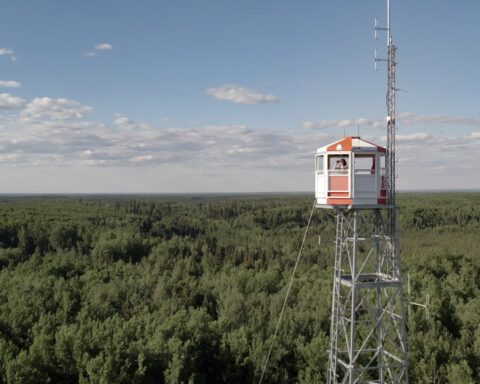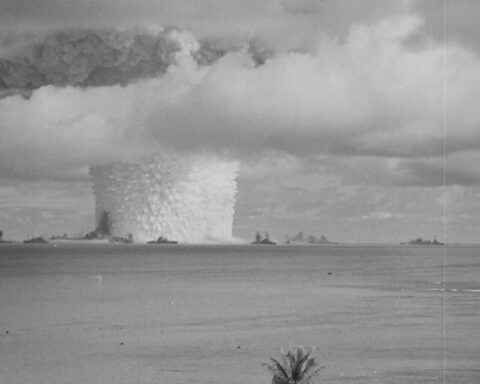Ice on Fire
(USA, 91 min.)
Dir. Leila Connors
Environmental docs can be like blockbusters in their habit of following tropes. There’s the visually stunning, dialogue-free documentation of our doom (Anthropocene), the activist manifesto (Sharkwater), or the didactic and self-aggrandizing PowerPoint presentation (An Inconvenient Truth). Leila Connors’ Ice on Fire focuses on something far too often overlooked: the scientists themselves. These unsung investigators have spent their lifetimes collecting empirical data that should be the basis for our policies, our actions, and understanding of the processes change the world we call home.
Produced and narrated by Leonardo DiCaprio, the actor, like he did with The 11th Hour and Before the Flood, brings some of his star power to attract attention to what otherwise may well be another in a long line of eco-docs. The film persuasively demonstrates the decades-long projects by an army of scientists, looking at rising CO2 levels and the effect that has on the entire ecosystem. Save for the inclusion of a few authors that lean towards the doom-and-gloom, the scientists themselves speak with the clarity, coherence, and confidence of their profession, presenting in entirely convincing ways what we know (and what we don’t know) about the massive changes taking place due to human activity.
DiCaprio’s narration avoids histrionics while at the same time evading dryness or dullness. Throughout, Connors and her editorial team thread the needle, balancing between the complex science at the heart of the matter and the accessible storyline about the effect it’s having on the climate. Rather than simply dumbing things down, using patient explanations and some particularly well designed graphics and animations, the cycles of change are articulated supremely well.
Of particular note is the subtle shift in discourse the film makes by moving the conversation beyond simply talking of reducing fossil fuel use. It moves toward the complex and controversial process of sequestration. The film convincingly notes that the process of capturing carbon is “natural,” and it’s the very process of extracting oil/gas that’s in fact reversing what had been captured over millennia. We’re burning the carbon the Earth has captured, and so we have an opportunity collectively to put the carbon back into the ground or trees, helping reverse the rising gasses in our atmosphere and reversing the deadly trends. The challenge is enormous, but having a multi-faceted approach rather than a simplistic (and unrealistic) call for massive change in a short period to reverse course on hundreds of years of human activity is presented as not only the pragmatic solution, but also a plausible one.
For those who simply advocate a complete abandoning of consumption of fossil fuels, this may be anathema, but freed from dogmatic environmental advocacy, the pragmatic and multi-phased solution illustrates not only a path forward, but the very process by which scientists (as divorced as possible from the politics) work on a regular bases. There’s no magic bullet here, of course. The myriad ways that these thinkers explore modes of reduction, capture, and reversal of the changes to our atmosphere provide the film with a modicum of hope. Far from a diatribe or an aimless call to arms, the film demonstrates that through ingenuity and tenacity we have ways of achieving these goals.
Again, for those more stringent in their views, this will appear as simplistic and counterproductive to real change. Yet the film never shies away from the seriousness of the issue, looking at those researching what may be less “pure” solutions that nonetheless accomplish the goal of helping the planet heal. By being open to these more pragmatic and less ideologically intense positions, the film highlights effectively that there are paths to follow that will allow a healthier environment to avoid seismic shifts in climate without obliterating centuries of human and industrial progress.
The film does run out of steam towards the end, and at feature-length, it could probably use some editorial sequestration of its own. Still, this is a film that may well go beyond the political gridlock and inspire in a different way, showcasing the minds devoted to looking at solutions even if those on the policy side waver and obfuscate.
Visually compelling, intellectually sound, and with accessible narration by a movie superstar, there’s plenty to admire about Ice on Fire. It was human achievement that caused the mess, and it need not be hubristic to believe that humans could be playing an active role in cleaning it up rather than simply cutting back and waiting for the process to reverse. These are bold solutions, and the film does well to highlight this community that’s laying the foundation for the very survival of our species on this planet, illustrating that by tackling these issues in a multiplicity of ways there remains well founded hope rather than simply complacency or despair.
Ice on Fire premiered at the 2019 Cannes Film Festival and airs on HBO and Crave on June 11.










